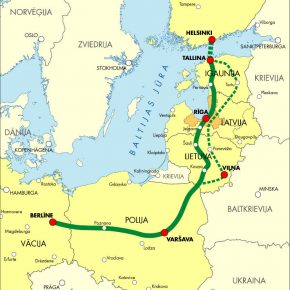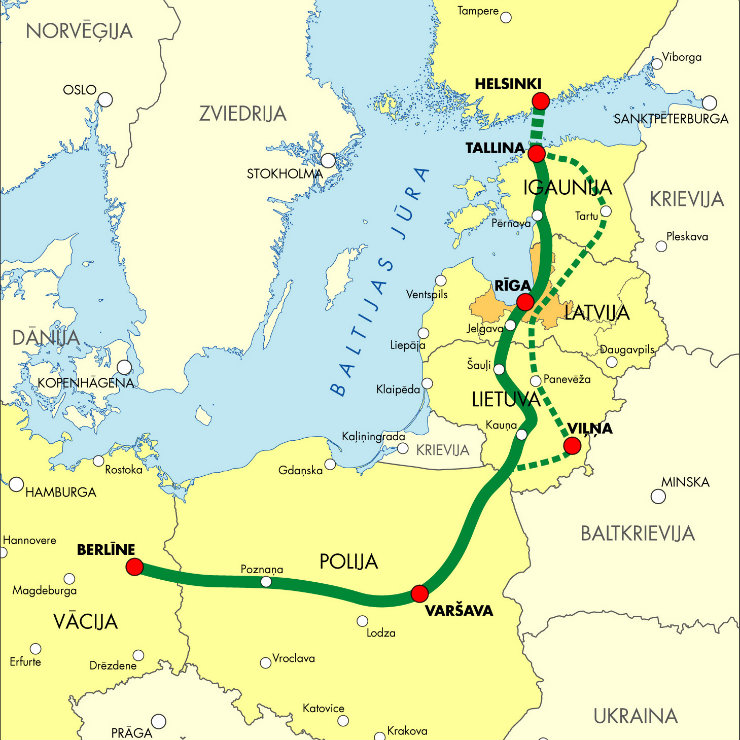Tydzień w gospodarce
Category: Trendy gospodarcze

(Latvian Ministry of Transport and Communication, Public domain)
The proposed rail link between the three Baltic capitals had been under threat because of an inability of the three partner countries, Lithuania, Latvia and Estonia to co-operate fully, leading to tensions with the EU backer.
Latvian public broadcaster LSM.LV described tensions between the national partners in Rail Baltica, tension that could scupper the prospects of EU funding. On September 7th the Rail Baltica council met in Riga and hammered out a policy that will resolve thorny issues of procurement and demarcation.
The main issue was the centralization of procurement both at a national and super-national level, that is to say should individual countries decide procurement and tendering individually or should this be done jointly.
Uldis Augulis, Latvian Minister of Transport, said that the agreement was a benchmark in co-operation “the beginning has not been easy. I believe that all three countries are interested in receiving and financing in the future, growth and development. This is undoubtedly a challenge but also a huge opportunity.”
The compromise consists of three levels:
The company will be managing issues such as project standards, marketing and research centrally. The signing off of the compromise took place on September 30th but the professional component of the Board of Rail Baltica is still to be agreed although this may take a month. In September, the only party that didn’t signed the agreement were Lithuanian Railways.
The Rail Baltica project is an ambitious undertaking designed to link by rail Tallinn, Riga, Kaunas and eventually Warsaw and even Venice. Starting in January 2015 it is estimated costa are EUR500m. In essence, the project will replace the old soviet wider gauge rail with a European one.
In 2014, the three countries formed RB SA, a joint-venture company designed to manage the program as a whole and to get economies of scale regarding costs and tendering. Recently it seem that local particularisms had token over with, for example, Lithuania going alone on a section of track from Kaunas to Poland, or the partners going separate ways in building the local infrastructure that favors local contractors over joint ones.
Lithuania also wanted VAT on work carried out in Lithuania to be paid in Lithuania according to portal Think Railways. This had led to tension with the chief financial backer the European Union which has granted Latvia with EUR238m for the first round of the project. By 2020, the Baltics may receive a total of EUR442.2m (co-funding of 81.83 per cent) for this project.
Michael Cramer, Chairman of the European Parliament’s Transport and Tourism Committee is reported as saying “We need to put pressure on the Baltic countries to work together, because it is still a European project financed by European taxes.”
Baiba Rubesa, Rail Baltica CEO, commenting on the particularism that threatened the financing of the project said “There are other interested parties who would like to see a situation, where, for example in Lithuania only Lithuanian will build for Lithuanians with Lithuanian workers.”
The CEO of Lithuanian Railways, Stasys Dailydka has disclosed that on October 7th he signed the agreement. Before that Rail Baltica said that it had been notified by the EU’s Directorate General on Transport and Mobility that it might open procedures in the near future to halt funding for Lithuania. Dailydka said that the final decision taken by the Lithuanian government was unrelated to a statement that the European Commission might suspend the financing of the entire Rail Baltica project.
The rail link will accompany the road link Via Baltica, linking Poland with the Baltics and Finland. The Rail Baltica project seeks to re-establish a direct link between the Baltics and the European railway network. The project is expected to ease regional integration by means of a railway connection from Helsinki that would link Tallinn, Riga, Kaunas, Warsaw, and Berlin. It will have over 1600 km and is expected to be completed by 2020.
This route has not been without its hiccoughs too. To avoid damage to areas of outstanding natural beauty and conservation, the Polish part of the road had to be diverted at Augustów via Łomża because of pressure from conservation groups.

